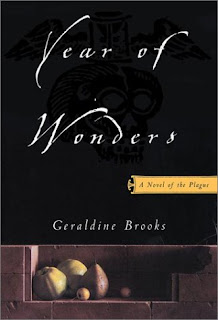Year of Wonders
Summary (from the publisher): When an infected bolt of cloth carries plague from London to an isolated mountain village, a housemaid named Anna Frith emerges as an unlikely heroine and healer.
Through Anna's eyes, we follow the story of the plague year, 1666, as her fellow villagers make an extraordinary choice. Convinced by a visionary young minister, they elect to quarantine themselves within the village boundaries to arrest the spread of the disease.
But as death reaches into every household, faith frays. When villagers turn from prayers and herbal cures to sorcery and murderous witch-hunting, Anna must confront the deaths of family, the disintegration of her community, and the lure of a dangerous and illicit love. As she struggles to survive, a year of plague becomes, instead, annus mirabilis, a "year of wonders."
Inspired by the true story of Eyam, a village in the rugged mountain spine of England, Year of Wonders is a richly detailed evocation of a singular moment in history. Written with stunning emotional intelligence and hailed as an "astonishing re-creating of how it felt to be a victim and survivor of the year of wonders and horrors" (Thomas Keneally), Brooks's novel examines the collusion of faith, science, and superstition at the cusp of the modern era. Exploring love and learning, loss and renewal, Year of Wonders succeeds as a spellbinding work of historical fiction and an unforgettable read.
Review: I was intrigued by the premise of this novel, based on the true story of the village of Eyam that decided to seal off their village when plague strikes in 1666, rather than risk the spread of the disease to surrounding communities. Brooks' tells the story from the perspective of the minister's servant, who was a real historical figure who did survive the plague. Brooks imagines the servant as Anna Frith, a young woman who loses her husband to the mines and her young sons to the plague.
If you're going to read a book about the plague, you have to be prepared for a depressing tale. Yet it was still eerie to still Anna in a world where more people have died than survive. The brutality and violence of the villagers' actions was in many ways more shocking than the plague. The attack on innocent women accused of witchcraft and the violent acts of Anna's selfish father were particularly unsettling.
I really appreciated the fact that Brooks does not romanticize her story. Anna's childhood was grim and her father unloving and unforgivable. Anna was pragmatic in marrying the kind but simple Sam, and describes her affection, not love, for her hard-working husband. I could also see the evidence of the author's research and historical detail, such as the description of the lead mines and laws, which provided the main source of livelihood for the villagers. Additionally, the analogies and language used to convey the brutality of the disease was effective. For example, Anna describes in detail the lashings her father received as a prentice seaman and uses it to describe the cruelty of plague; "The most skillful, he said, could land the lash so exactly as to work right through the muscle until the very bone lay bare. The Plague is cruel in the same way. Its blows fall and fall again upon raw sorrow, so that before you have mourned one person that you love, another is ill in your arms" (80).
My one disappointment with this novel was the implausible conclusion. I don't believe that a largely uneducated English villagers from the late 1600s, who sacrificed her family and risked her own life to remain with her village, would leave and go to a foreign land. The plot details about the minister and his wife Elinor also struck me as unlikely and far-fetched. However, overall a well executed historical fiction novel that illuminates a little-known sacrifice of a village that nobly tried to save other villages from a deathly disease.
Stars: 3



Comments
Post a Comment